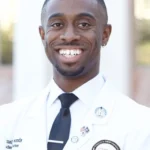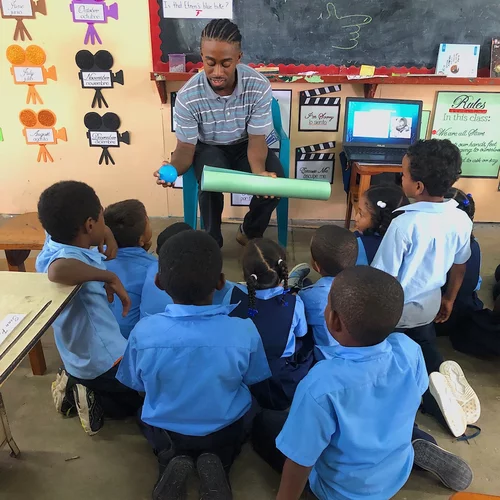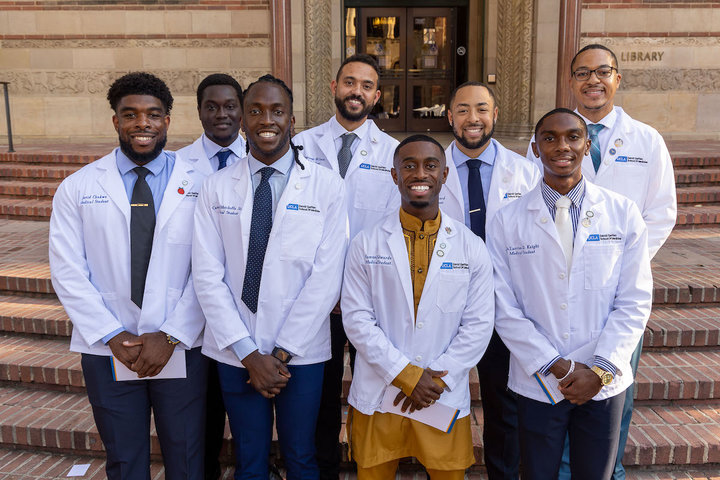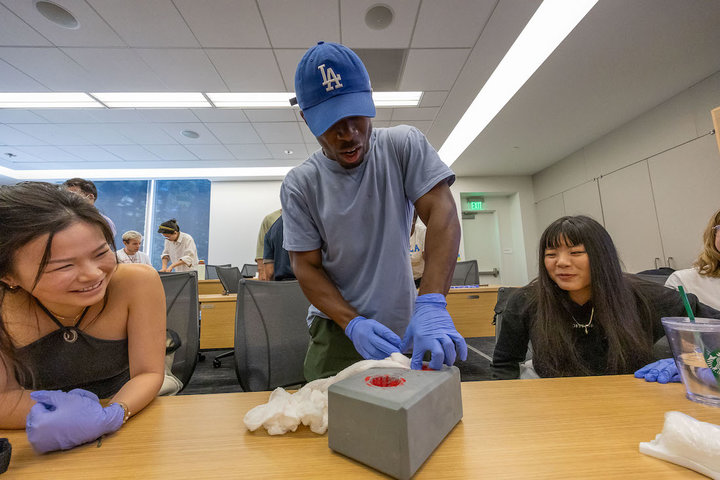Helping people in underserved areas live their healthiest lives
Meet Samuel Edwards

Samuel Edwards (Belize)
Medical student Samuel Edwards remembers little from his early childhood in Accra, Ghana. When he hears the word “home,” he pictures Toledo, Ohio — where his parents eventually settled after moving to the United States.
He counts his mother among his strongest motivations for pursuing a medical career. After she became sick in 2017, Samuel developed a more serious interest in learning as much about health and healthcare as possible.
He’d thought about going to medical school previously, but her sickness anchored his future plans in a deeper sense of purpose. He began seeing medicine as more than something to study at school.
“I realized medicine is what I’m called to do with my life.”
After earning both bachelor’s and master’s degrees in Medicine, Health, and Society from Vanderbilt University in Nashville, Tennessee, Samuel joined the Peace Corps. He left the States for a rural village in Belize, where his time as a community health worker and educator would open his eyes to more ways he could serve and heal as a future physician.
Fun Fact: Samuel loves dancing, especially the improvisational art of freestyle street-dance.
Confronting barriers to health
Samuel’s time in the Peace Corps brought him close to many people directly impacted by the lack of healthcare resources and infrastructure in rural Belize.
One of his colleagues at a local school had a daughter fighting a rare form of bone cancer. She couldn’t get proper care at home, and the family often spent entire days traveling to Mexico for appointments, even minor follow-ups.
This family’s circumstances, while heartbreaking, were not uncommon in the area.
“There are situations where a family has to uproot their entire life to even have a chance,” Samuel says. “I just felt how unfair that was, particularly as someone who had done a lot of work in undergrad in the pediatric oncology space.”
The situation really struck him—how the process of getting essential care, something that should benefit health, could also take such a psychological and financial toll.

“I saw the extent to which rural and under-resourced areas see so many health challenges,” he recalls. “I saw alignment between those places and the underserved, inner-city areas in the United States — areas I grew up in.”
His observations reinforced a harsh reality he already understood at some level—that where a person lives can determine their likelihood of enjoying optimal health. Shortly after he confronted this, the onset of the COVID-19 pandemic cast the area’s long-standing inequities into even sharper relief.
The village’s residents had to travel far to receive essential care. During emergencies, their distance from the nearest paramedics and emergency medical technicians (EMTs) put them at risk of serious complications and even death from conditions otherwise manageable if treated adequately.
The more health inequities Samuel witnessed, the more motivated he felt to pursue solutions. He knew he wanted to make something happen, to make things better.
“I felt like I needed to go out and do my best to help people living in under-resourced and underserved areas live their healthiest lives,” he says. “And that really drove me to pursue med school.”
From Belize to Boston
Samuel’s motivation to become a doctor had grown stronger than ever. However, the COVID-19 pandemic understandably presented several significant obstacles.
The pandemic required him to leave the village where he planned to live and work for the next few years—cutting his Peace Corps service short. The unexpected evacuation forced him to recalibrate and readjust his plans. Samuel decided this was the time to reignite his journey towards positive impact through medicine.
In September 2020, he moved to Boston, Massachusetts to conduct research with a maternal and child health project at Harvard Medical School and begin a post-baccalaureate program at Harvard University.
“I wanted to get myself on my feet academically,” he says. “I also wanted to get more experience in the medical field to make sure that I was truly ready for this.”
Feeling ready for this—feeling prepared for med school—was deeply important to Samuel.
“I wanted to come to med school ready to contribute.”
The journey presented plenty of challenges. Samuel says leaps of faith, raw determination, and his sense of purpose kept him going.
“You can find ways to make the dream happen when you’re driven by that sense of purpose.”

Life as a Med Student
Samuel persevered to forge a path to medical school—the medical school of his dreams.
He chose the PRIME-LA track offered jointly by the David Geffen School of Medicine at UCLA (DGSOM) and Charles R. Drew University (CDU). The program engages students in coursework and clinical experiences that prepare them to care for underserved populations and to innovate solutions to structural inequities.
“I have curricular support. I have structured mentorship. I have guidance in creating a career that involves working with underserved populations and doing health equity and health justice work.”
Samuel chose UCLA mostly, but not exclusively, based on academic rigor and a focus on health equity. As someone who grew up with Ohio’s sometimes temperamental seasons, he loved the idea of enjoying sunny, mild weather year-round. Plus, he has plenty of relatives who call Southern California home. He loved the idea of venturing to the West Coast but still having a connection to home nearby.

“At the end of the day, I always wanted to be here. Even when I was growing up,” he says. “I always felt connected to this area. The idea of acting on my sense of purpose here while also having familial and institutional support was impossible not to pursue.”
Samuel especially loves how much he’s been able to get out into the local community as a med student. He offers mentorship, clinical-skills, and clinical reasoning sessions at a local high school and practices street medicine with the UCLA Mobile Clinic Project.
“I love working on the ground with folks who are either marginalized or are in low-resourced settings.”
Believing in a Fulfilling Future
Looking back on his journey in medicine so far, Samuel feels equally grateful for the opportunities and challenges.
“Every challenge made me a more confident and determined individual,” he says.
Specifically, he’s determined to become an empathetic physician that improves the health and happiness of marginalized individuals around the world. Thinking long term, he would love to return to the Caribbean, possibly even Belize, to bring his progress full circle by directly addressing some of the problems that inspired him.
He has plenty of time to decide what medical specialty to pursue and map out specific career plans. For now, he’s content envisioning himself providing thoughtful, longitudinal care. He sees himself supporting patients beyond the medical problems that led them to seek his care—helping them become the best versions of themselves.
“I think about how I can best contribute to the overall health and happiness of everyone around me.”
Considering what he might say to his younger self just starting out or any young students beginning their medical education and training, the same core words of wisdom come to mind.
“You’re capable of a lot more than you think you are. You are worthy.”
He understands now why he struggled earlier in his education. He didn’t truly believe he belonged in some of those early academic spaces.
“I think I had a lot of self-doubt. I didn’t really think I was capable of some of the things that I was doing or that other people encouraged me to do,” he says. “But you have to believe in the person you’re going to become, that you are becoming.”
He loves knowing that in just a few years, he will be that person, a doctor, touching patients’ lives every day.
“I explored different career fields, but nothing felt as fulfilling as doctoring and having a direct impact on the health and happiness of individuals, particularly folks in marginalized or underserved communities,” he says. “I can’t envision doing anything else more fulfilling with my life.”
I woke this morning feeling totally disheartened, wondering when and why our country has become so cruel. And then this beautiful article about Samuel Edwards came across my email, serving as an antidote to my despair. Thank you, Samuel, you will make a wonderful doctor, and thank you, John, for posting this story.
That’s a very nice and appropriate comment, Marnie. I had the same feeling after reading Samuel’s story. You are right, it helps with the despair.
My health journey has included meeting many persons in the healing professions. The medical professions are magnets for young people looking for careers where they can help those in crisis and contribute to society’s well-being. I have been very impressed by the selflessness of those staffing our hospitals, clinics and healthcare centers. The spirit that drives the Peace Corps is also alive and well in the medical professions.